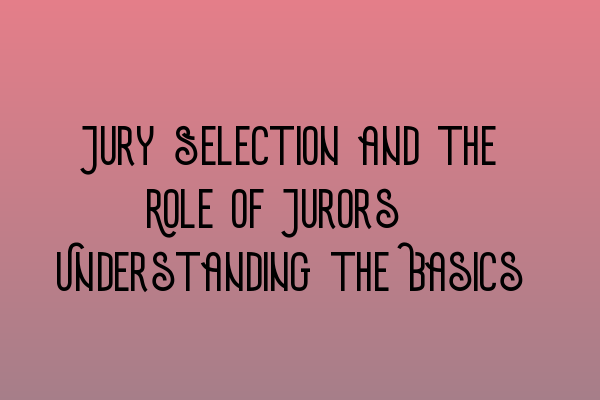Jury Selection and the Role of Jurors: Understanding the Basics
Welcome to SQE Criminal Law & Practice Law UK, your trusted source for legal insights and guidance. In this article, we will delve into the intricacies of jury selection and explore the important role jurors play in our criminal justice system.
The Importance of Jury Selection
Jury selection is a critical process in any criminal trial. It involves choosing a panel of individuals who are deemed fair and impartial to weigh the evidence and determine the guilt or innocence of the accused. A carefully selected jury ensures a fair and just trial.
When selecting jurors, various factors are considered, including their background, experiences, and beliefs. The goal is to create a diverse jury that represents a cross-section of society, allowing for different perspectives and insights.
The Role of Jurors
Jurors serve as the “finders of fact” in a criminal trial. Their primary responsibility is to carefully listen to the evidence presented by the prosecution and the defense, and then reach a verdict based solely on the facts and the law.
Jurors are expected to be objective and impartial throughout the trial. They must set aside any personal biases or prejudices and base their decision solely on the evidence presented in the courtroom.
During the trial, jurors are not passive observers. They actively participate by taking notes, asking questions (through the judge), and engaging in deliberations with fellow jurors during the jury room discussions.
The Selection Process
The selection of jurors begins with a pool of potential candidates, usually drawn from the local community or voter registration lists. The courtroom process, known as “voir dire,” involves questioning prospective jurors to determine their suitability for the trial.
The prosecution and defense attorneys have the opportunity to ask questions to assess any potential biases or prejudices that may impact a juror’s ability to make an impartial decision. They can challenge potential jurors based on valid legal reasons, such as bias, prior knowledge of the case, or personal relationships with the parties involved.
Related Articles and Resources
For aspiring solicitors preparing for the SQE exam, we recommend checking out our article on SQE Exam Prep: Essential Study Materials for Aspiring Solicitors. This resource provides valuable insights into the study materials and strategies you need to excel in the examination.
If you’re interested in building strong cases with expert testimonies, our article on Expert Testimonies in UK Courts: Building Strong Cases offers valuable guidance on leveraging expert witnesses to enhance your legal arguments.
For a comprehensive understanding of the Solicitors Qualifying Examination format, check out our informative guide on Demystifying the Solicitors Qualifying Examination Format. This article covers the structure, topics, and preparation strategies for this crucial examination.
If you are an international lawyer planning to take the SQE exam, our article on SQE Exam for International Lawyers: Challenges and Success Strategies provides insights into the unique challenges you may face and offers effective strategies to overcome them.
Lastly, if you’re an entrepreneur in the UK looking to form an LLC, our step-by-step guide on LLC Formation Made Simple: Step-by-Step Guide for UK Entrepreneurs will walk you through the process, ensuring a smooth and successful establishment of your business entity.
Conclusion
Jury selection is a crucial process that ensures a fair and impartial trial. Jurors play a vital role in our criminal justice system, serving as finders of fact. Understanding the basics of jury selection and the role of jurors is essential for legal professionals and individuals interested in the workings of the criminal justice system.
Thank you for reading this article on SQE Criminal Law & Practice Law UK. For more legal resources and insightful articles, explore our website and stay tuned for future updates.
